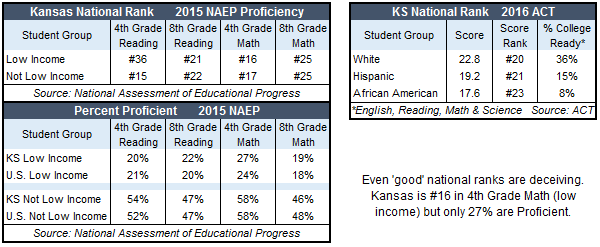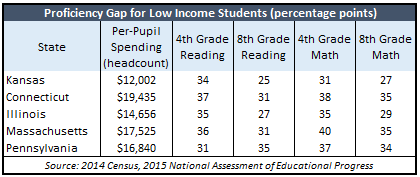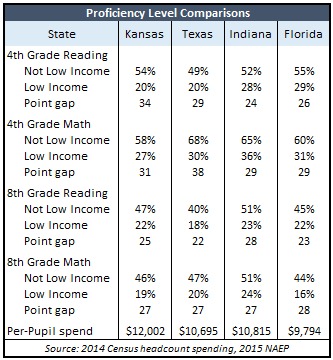Like teenagers lobbying their parents for new stuff, the Kansas Association of School Boards and taxpayer-funded school lawyers want hundreds of millions more from taxpayers, and claim that student achievement hangs in the balance.
Teenager: You know, my grades would be a lot better if you buy me a new phone to record notes. And if I had a car, I could get home sooner to study.
Parents: You said your grades were among the best in your class. Now they’re low?
Teenager: Well, the school just records my grades but that isn’t fair. I have my own methodology. And you know, some kids do a lot worse so compared to them I’m doing great….but you don’t want my grades to go down, do you?
Parents: And you expect us to believe that just spending more will improve your grades?
Teenager: Not spending…investing. Don’t you care about me?
Believe it or not, this is the circular logic employed by school lawyers and KASB. In a recent court brief, the lawyers admit that low income kids are doing much worse than their more affluent peers and since the gaps are wider now, they believe that that proves funding is too low. It’s like saying there were more rainy days this year, so we need more sunshine to get better grades.
KASB has a different view, saying outcomes are #10 in the nation, even though per-pupil funding is ranked #29. Their methodology is bogus but their contention refutes the notion that spending more causes outcomes to improve. Of course, they claim citizens need to ‘invest’ a lot more or outcomes will decline.
The truth is that Kansas doesn’t have a single top ten ranking in actual achievement performance. National ranks on ACT are in the 20s (White, Hispanic and African American) and proficiency rankings on the National Assessment of Educational Progress (NAEP) range from the mid-teens to the mid-30s. But KASB says if you count some students twice and throw in a lot of things that don’t measure actual learning levels, Kansas magically rises to #10! That’s some mighty fine teenager logic…or if you prefer, husband rationale for not cleaning the garage today (I’ve seen me do it).
 Some of Kansas’ NAEP achievement gaps are worse than in 2009 but the lawyers ignore reality in claiming that money is the reason. For starters, Connecticut, Illinois, Massachusetts and Pennsylvania spend a lot more per-pupil than Kansas but have wider achievement gaps on 15 of the 16 comparisons below. If one follows school lawyer logic (“a” exists and “b” exists, so “a” must cause “b”), one might think that spending more causes achievement gaps to widen.
Some of Kansas’ NAEP achievement gaps are worse than in 2009 but the lawyers ignore reality in claiming that money is the reason. For starters, Connecticut, Illinois, Massachusetts and Pennsylvania spend a lot more per-pupil than Kansas but have wider achievement gaps on 15 of the 16 comparisons below. If one follows school lawyer logic (“a” exists and “b” exists, so “a” must cause “b”), one might think that spending more causes achievement gaps to widen.  But the absurdity doesn’t stop there. Texas, Indiana and Florida spend less than Kansas and generally have the same or smaller achievement gaps. Of the twelve achievement gap comparisons, Kansas only has a smaller gap in 3 cases; the gap is the same in 2 cases but Kansas has a larger gap in 7 instances.
But the absurdity doesn’t stop there. Texas, Indiana and Florida spend less than Kansas and generally have the same or smaller achievement gaps. Of the twelve achievement gap comparisons, Kansas only has a smaller gap in 3 cases; the gap is the same in 2 cases but Kansas has a larger gap in 7 instances.
Now let’s compare the actual achievement  levels, with each state having 8 comparisons to Kansas (2 grades, 2 subjects and 2 student cohorts). Texas and Florida both beat Kansas 4 times, tie once and lose 3 times. Indiana wins 7 times out of 8.
levels, with each state having 8 comparisons to Kansas (2 grades, 2 subjects and 2 student cohorts). Texas and Florida both beat Kansas 4 times, tie once and lose 3 times. Indiana wins 7 times out of 8.
These are just a few examples that refute the notion that spending more (or less) causes achievement to change. That’s not to say that money doesn’t matter, but just like your family budget, it’s how the money is spent that makes the difference.
Here’s something else the taxpayer-funded lawyers didn’t mention. NAEP scores didn’t just decline in Kansas, but across the country in 2015 and especially so in Math, a subject that has been the target of much Common Core controversy. Could the transition to Common Core have anything to do with lower scores and wider gaps? The Department of Education is on record as saying so; I attended a legislative committee hearing where KSDE was asked why they thought the 2013 NAEP scores dipped, and their only speculation was that the transition to Common Core might have been an impact. Not a word was said about funding.
Could achievement gaps improve if most of the money allocated for improvement of low income kids’ scores was actually spent for their direct, exclusive benefit? Probably, but KPI scholar David Dorsey discovered that most of the billions intended to help those kids went elsewhere.
Could all students benefit by operating more efficiently and spending the savings on Instruction? Probably, but school administrators and their lobbyists oppose every effort to help school boards save money; they openly say they want to be inefficient and expect taxpayers to pay extra for the waste.
Reality doesn’t matter to KASB and taxpayer-funded school lawyers; they just want more money. And if they get it from the courts or the Legislature without any accountability for outcomes, students will be no better off because after all, it’s just about getting more money.



